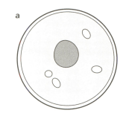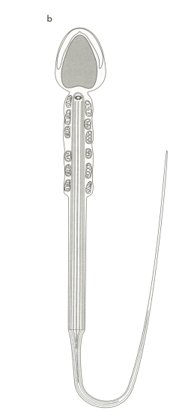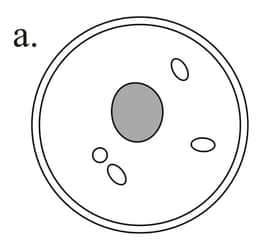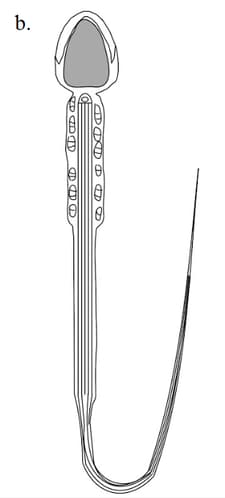

The figure shows a diagram of a human female and male gamete.
Use black or dark blue to label all the structures on each gamete that you would find in any animal cell.



Important Questions on Reproduction in Humans


The figure shows diagrams of human female and male gametes.
Use red or another contrasting colour to label all the structures on each gamete that are adaptations for their specialised functions. Explain how each feature that you label helps the cell to perform its function.
The placenta is an organ that allows a mother’s blood and her foetus’s blood to be brought very close together, without mixing. Substances are exchanged by diffusion between the two blood systems. The lungs also contain surfaces where substances are exchanged by diffusion. (This is not the case in the foetus, whose lungs do not function until after it is born.) The table shows some features of the placenta and the lungs in a human.
| Feature | Placenta | Lungs |
| Total surface area / m2 | 16 | 55 |
| The thickness of the barrier across which substances must diffuse / um | 3.5 | 0.5 |
| Approximate rate of blood flow/cm3 per minute | 500 | 5000 |
Explain how the structure of the lungs provides the large surface area shown in the table.
Oxygen moves by diffusion across the exchange surface in both the placenta and the lungs.
State precisely where oxygen moves to and from in the lungs.
Oxygen moves by diffusion across the exchange surface in both the placenta and the lungs.
Explain fully why the net movement of oxygen is in this direction in the lungs.
| Feature | Placenta | Lungs |
| Total surface area / m2 | 16 | 55 |
| The thickness of the barrier across which substances must diffuse / um | 3.5 | 0.5 |
| Approximate rate of blood flow/cm3 per minute | 500 | 5000 |
Use the data in the table and your knowledge of the features of gas exchange surfaces, to explain why more oxygen can be absorbed per minute across the lungs than across the placenta.
Oxygen is not only a substance that crosses the placenta from the mother's blood to the foetus's blood.
Amino acid moves across the membranes of the cells in the placenta by active transport.
Explain how active transport differs from diffusion.
The table shows the percentage of people in Asia and the Pacific region who are infected with HIV, who knew that they had the virus.
| Year | Percentage of people living with HIV who knew they had the virus |
| 2015 | 59 |
| 2016 | 62 |
| 2017 | 65 |
| 2018 | 65 |
On the grid below, draw a bar chart to display these data.
| Year | Percentage of people living with HIV who knew they had the virus |
| 2015 | 59 |
| 2016 | 62 |
| 2017 | 65 |
| 2018 | 65 |
Suggest how the data in the above table have been estimated.
